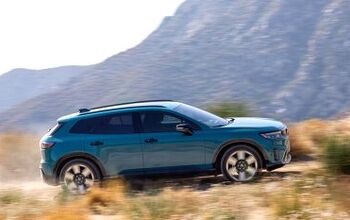80% of US Car Buyers Won't Buy Domestic… or Imports
J.D. Power and Associates has just released their 2007 Escaped Shopper Study (an APB has been issued). After surveying 31,355 new-vehicle buyers between May and July 2007, J.D.'s mob says that 80 percent of US new car buyers won't cross-shop an import (if they're domestically inclined) or a domestic (if they're a import inclined). That's bad news for The Big 2.8. But it gets worse. The 20 percent of buyers up for grabs "frequently decide against import brands for financial reasons, most often citing that the import didn't offer aggressive rebates or other incentives." In other words, Detroit's fire sales have caught up with them but good; they're high cost producers appealing to a price-focused audience. At the same time, the study says import buyers who reject a domestic model cite "perceived vehicle attribute deficiencies:" concerns for reliability, gas mileage or poor resale value. J.D.'s automotive retail research manager connects the dots. "To win back market share, domestics are faced with two alternatives," Kara Steslicki opines. "Either continue outspending imports on incentives, or find vehicle specific opportunities, such as styling or promoting a positive dealer experience, that can have an immediate impact on consumer perceptions of the brand." Not bloody likely then.
More by Robert Farago


































Comments
Join the conversation
umterp85 : Again, I repeat—if this had been GM—the outrage would have been “deathwatch” like. When it is Toyota problems—-it is the consumers fault. I can assure you that TTAC would have ignored the story if it happened to GM. You may notice that we're not big into recall stories in general. We consider them a normal part of doing business. IF a recall seems particularly newsworthy, we might cover it (e.g. Ford cruise control fires). But this one didn't make the hit parade.
UMTERP85-actually (going back to an earlier post) the point of BARF is that NOBODY (even Toyota)gets a free ride. It is about what the buyer actually experiences. Every company BARFs out some buyers. Lets add a new factor, Happy Users Group Score (HUGS, ain't that cute). If a company gets more HUGS than BARF they do well. If more BARF they lose. Bob Lutz (and others) cherry picks the statistics and implies that the perception gap is ALL in the consumers heads. Looking at the FULL RANGE of statistics I see support for the consumers buying patterns. It is evidense that there is "perception gap" in Bobus Magnus' skull. If the domestics live in denial and do not FINISH closing the real reliability gap that remains their HUGS to BARF ratio will continue to be poor and they will lose market share regardless of how they spin it. Just a thought. Cheerio, Bunter
Re: umterp85 @ September 28th, 2007 at 9:23 am: Let's look at some recent Big 2.8 recalls, shall we? Ford: 8/7/07, 3.6 million recalled, cruise control switch that may short-circuit and start fires. GM: 8/31/05, 800k recalled, salt corrosion in brake sensor causes anti-lock brake malfunctions. Linked to 228 crashes before recall. Lexus: 55k recalled because floor mats may scrunch up under the accelerator. Yeah, that's obviously exactly as bad as fires and brake failures. When it comes to most Toyota recalls, it IS the consumer's fault. Lexus is like my parents' marriage. You know you've got it good when the biggest argument is over the shower curtains.
Altoids----don't forget the 3 million Toyota owners who had to class action Toyota into action over engine sludge. Also---check the DOT TSB's & Recall list for all recent Toyota launches----Cross compare with all recent Ford launches----I think you will be shocked at what Toyota DIDN'T get rights at launch and what Ford DID get right.